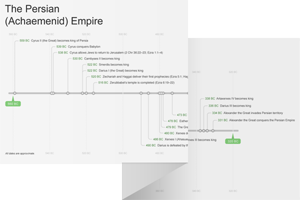44:1–5 After the reminder in 43:2–28 that Israel deserved judgment for idolatry, the tone of Yahweh’s message shifts back to that of hope and restoration. They sinned, but they are still His chosen people—He will save them. |
44:1 Israel, whom I have chosen See note on 41:8. Though this verse uses the same imagery as 41:8, the identifications are reversed. The servant here is corporate Israel, as in 41:8 and 43:10.
44:2 Jeshurun A poetic name for Israel, found otherwise only in the two poems attributed to Moses (Deut 32:15; 33:5, 26). It likely means “upright one.”
 Symbolic Names of People in Hebrew Table
Symbolic Names of People in Hebrew Table
44:3 water on a thirsty See Isa 35:6 and 43:20.
I will pour my spirit out on your descendants Salvation comes with the promise of the Spirit, which will enable their descendants to enjoy the promised blessing because they will be wholly devoted to Yahweh (see Joel 2:28–29). See note on Isa 43:5.
44:6–8 Yahweh’s status as true God, King, Redeemer, and Deliverer of Israel is declared again, and compared with the utter futility of belief in handmade idols. Most of this imagery has been used in chs. 40–43, but it is brought together in these three verses to lead into the sarcastic and detailed description of the work of an idol maker. |
 Understanding Israelite Monotheism
Understanding Israelite Monotheism
44:6 Yahweh, the king of Israel See 43:14–15.
I am the first See 41:4 and 48:12.
there is no god besides me See 43:10 and note (compare Deut 4:35, 39). This means that Yahweh is utterly unique and incomparable, not that other heavenly beings do not exist (see Deut 6:4; 32:17).
 Understanding Israelite Monotheism
Understanding Israelite Monotheism
44:7 things that are to come, and let them tell See Isa 41:22–23.
44:8 you are my witnesses God continues to call on Israel as his witnesses that he alone is God. See 43:10 and note.
there is no rock God is often described metaphorically as a rock. See 30:29; 26:4 and note.
44:9 All those who form an idol are nothing The idol-makers are tohu; the same Hebrew word is used in Gen 1:2 to describe the formless state of the world at the beginning of creation. Those who “create” other gods are not creators in the same sense of Yahweh, who formed order from chaos.
their witnesses Contrasted with Israel as God’s witnesses in Isa 43:10.
44:10 an image of which he cannot profit Craftsmen build idols expecting profit, but their efforts are useless (see 40:19–20; 41:6).
44:12 he lacks strength The craftsman is only human; he will grow tired and faint (contrasting with 40:30–31).
44:15 bows down to it The irony is intentional: The same wood used for cooking is used to carve an idol. The imagery highlights the absurdity of worshiping something made by human hands. The creation cannot be greater than the creator. The so-called god would not exist without the human responsible for creating it.
The imagery highlights the absurdity of worshiping something made by human hands. The creation cannot be greater than the creator. The so-called god would not exist without the human responsible for creating it.
44:18 They do not know Those who practice idol worship do not recognize its absurdity in part because they have been blinded to the truth (see Isa 6:9–10). The made-up speech of the craftsman in v. 19 articulates the ridiculous inner monologue an idol-worshipper might have if he was conscious of the reality behind his actions. See note on v. 15.
44:19 an abomination See 41:24 and note.
44:21–28 Another speech of redemption and salvation, which repeats themes from earlier speeches (see 42:15; 43:11–21, 25–26; 44:1–8). The passage culminates in the revelation that Yahweh has raised up Cyrus to bring about the promised restoration of Judah. |
44:21 my servant See 41:8; 42:19; 44:1–2.
44:22 your transgressions Compare 43:25.
I have redeemed you See 43:1, 18.
44:24 your redeemer See 43:14.
he who formed you in the womb See v. 2.
who stretched out the heavens alone See note on 42:5. Yahweh’s work as Creator of all the earth supports His ability to form Israel as a people and secure the promised redemption.
44:26 the cities of Judah Jeremiah 32:15 and 32:44 contain a similar promise that Judah will be rebuilt and inhabited.
44:27 I will cause your rivers to dry up See Isa 42:15.
My shepherd The Davidic kings should have held the role of shepherd of God’s people. Instead, it goes to a foreign conqueror (compare Ezek 34:1–10).

|
About Faithlife Study BibleFaithlife Study Bible (FSB) is your guide to the ancient world of the Old and New Testaments, with study notes and articles that draw from a wide range of academic research. FSB helps you learn how to think about interpretation methods and issues so that you can gain a deeper understanding of the text. |
| Copyright |
Copyright 2012 Logos Bible Software. |
| Support Info | fsb |
 Loading…
Loading…

